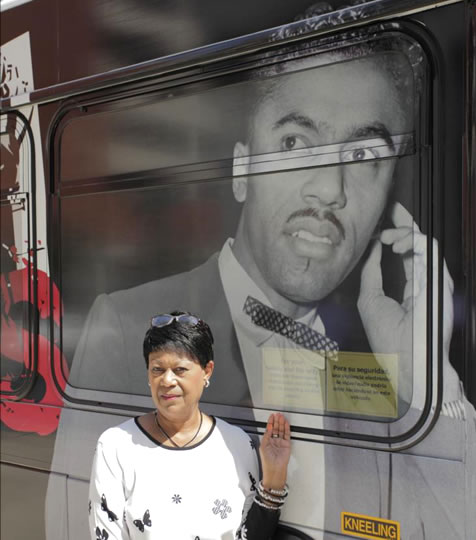Reflecting on the Freedom Riders
Normally it takes about a year to plan a major event like Freedom Riders. We had two months and two weeks from start to finish, arranging travel and accommodations for dignitaries (some from as far away as Nigeria), designing and populating a website, arranging for staging and sound, wrapping a bus, catering, printing, advertising, installing sidewalk markers, ordering port-a-potties, you name it.
We could have gotten lost in all those details and bemoaned the hurdles we faced along the way, but everyday we were reminded of the five brave individuals we were honoring – what they dealt with 50 years ago on a hot day in July as they were arrested while seeking to integrate bus terminals across the South.
We had hoped that they could all attend the ceremony. Three of the riders were relatively easy to find. Janet Reinitz is still very much involved in social activism as a muralist in New York. Reinitz spoke to History Chair John Kirk a few days before the event and shared one of her fond memories despite the chaos – inside their jail cell, Bliss Ann Malone, a fellow Freedom Rider, taught her how to do the Twist.
Unfortunately, Reinitz was unable to attend because of a pre-arranged trip to Ghana to design a community mural, but you can view an on-camera interview she did 10 years ago for the 40th Anniversary where she tells their story with vivid detail.
John Curtis Raines is now professor emeritus at Temple University. He hadn’t been back to Little Rock since he was arrested here in 1961, so he was grateful for the opportunity to visit again under vastly different circumstances. In this interview with Craig O’Neill on KTHV, he describes what it was like 50 years ago.
Two of the riders, Malone and Annie Lumpkin proved impossible to find ….so impossible even Oprah Winfrey couldn’t track them down for her Freedom Riders show. We used Oprah’s contact information and didn’t get any further than her researchers did. We also used contacts with the Missouri History Museum, a ward alderman for Bliss Ann’s last known address, the New York CORE office and assorted internet sites. We were able to trace Bliss Ann up until the year 2000, but could never find Annie.
And then there was the veteran leader of the Little Rock riders, Benjamin Elton Cox. When we located him, we found out Rev. Cox had had a stroke and was not expected to live much longer. Sadly, he passed away June 12, less than a month before the Freedom Riders’ 50th Anniversary.
His widow Edna Cox, their daughter, and Rev. Cox’s brother attended the ceremony on his behalf. That led to one of the most moving events of the weekend. On the morning of the anniversary event, the dignitaries were to ride the Freedom Riders bus to a brunch at the Clinton Library. When Mrs. Cox saw the bus with her husband’s photo prominently displayed, there were not many dry eyes to be found. Her presence made the event even more special to all of us working behind the scenes.
It is easy to think that the city the Freedom Riders arrived in 50 years ago doesn’t exist anymore. That the kind of prejudice that separates us is a thing of the past thanks to the work that they and many others have done through the years to break down barriers. People don’t burn crosses in someone’s yard anymore, there is an African-American president, and we work and go to school together.
I grew up here and hearing how things used to be always sounds like they are talking about another city. I went to integrated schools. I never saw a “whites only” sign. That history seemed like a million years and a million miles away, which just shows how blind you can be when you want to be.
However, working on the committee gave me the chance to work with a young woman who reminded me that while we have come a long way, we still have a long way to go. This young lady, in her mid-twenties, was the backbone of the event committee. Whatever needed to be done, she usually had it done before being asked. She handled a million details with ease and to perfection. She was fun to work with – not a prima donna bone in her body – pretty, intelligent, kind, willing to help, uncomplaining.
It wasn’t until she told me a little of her story – about death threats against her family, about not being able to play outside at times when she was a child because of threats of violence, about having to hire police to guard their temple on High Holy Days because of bomb threats – that I realized prejudice is alive and thriving. I know she thought I had reverted to being a two-year-old when she was telling me her story. All I could say was, “Why?”
I’m still haunted by her story. Maybe the Arkansas the Freedom Riders saw is not in the distant past. Maybe we still have far to go, and the new Institute on Race and Ethnicity will help. John Raines shared with us his story, how they got on a bus 50 years ago on a path toward racial equality. But, he said, the road doesn’t end for as long as discrimination of any kind exists. His voice calls to us to get on board. It’s time for us all to get on the bus.
Visit the Little Rock Freedom Riders website for photos, video, and related stories.

